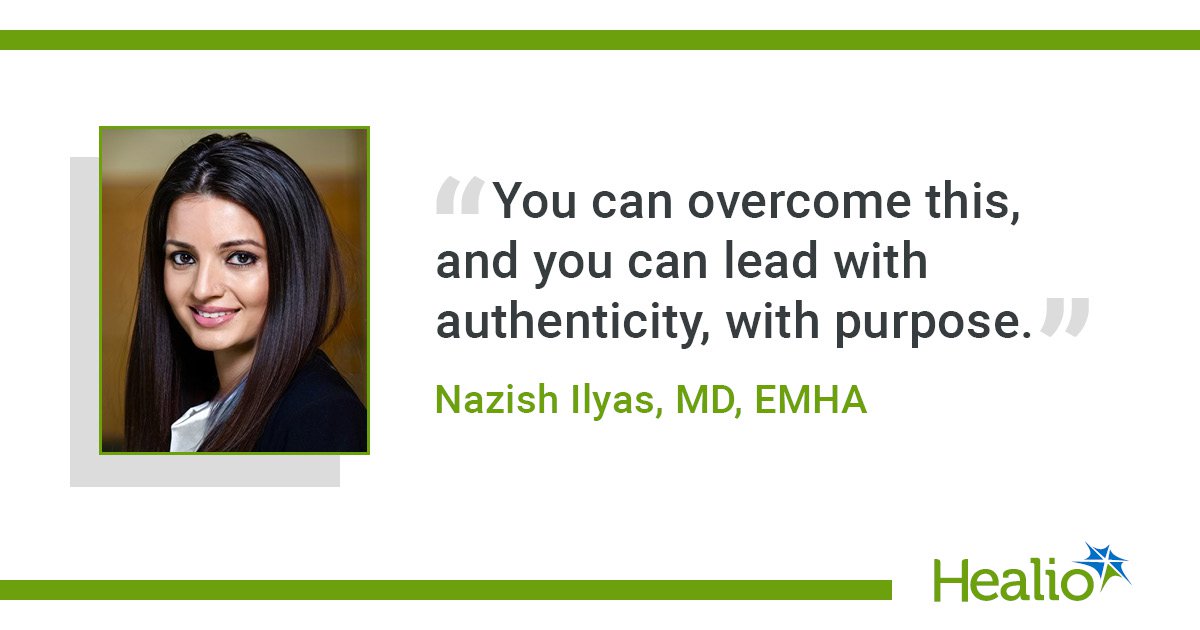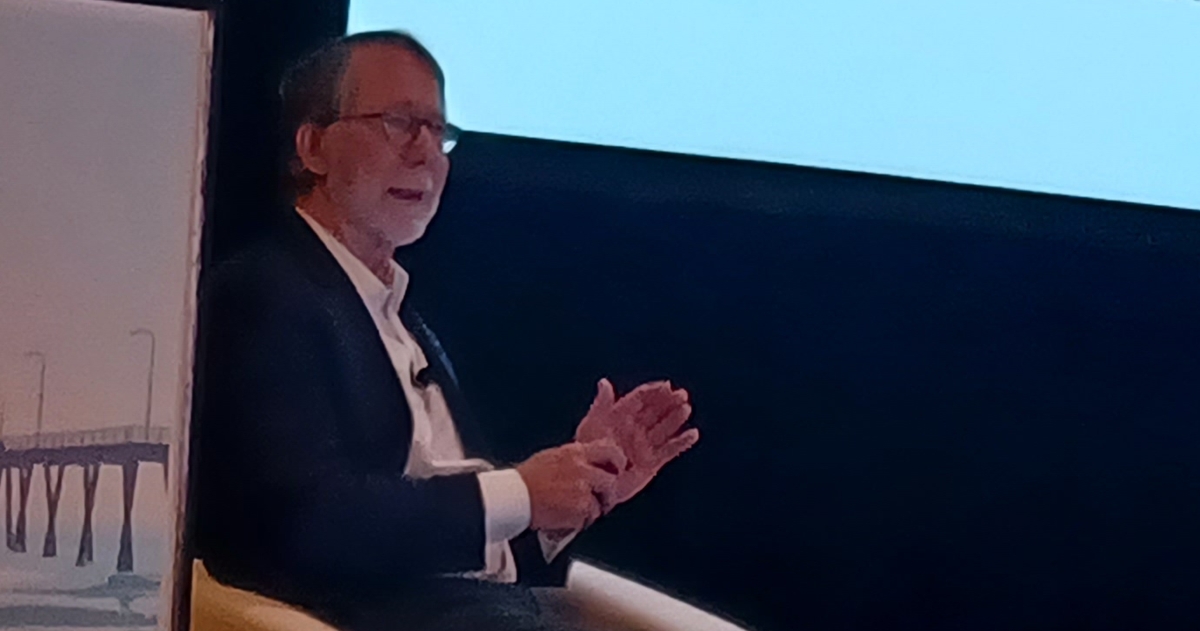October 07, 2025
12 min read
Key takeaways:
- Women in medicine face unique challenges in leadership.
- Speakers at the Women in Medicine Summit discussed those challenges and practical solutions to help women empower each other.
Women can use simple strategies to build each other up and level the playing field in medical leadership, according to presenters.
Katherine Hochman, MD, MBA, the inaugural director of division of hospital medicine at NYU Langone Health, and Nazish Ilyas, MD, EMHA, chair of medicine at Northwell Health, recently spoke at the Women in Medicine Summit (WIMS). They discussed 10 challenges women in medicine face as well as practical strategies to empower them to become leaders. The challenges include:

- tendency to conform to expectations and norms;
- the perfectionism trap: the reluctance to let go;
- the struggle to balance humility with self-promotion;
- obstacles in identifying mentors and sponsors;
- tendency to allow failure to lead to self-doubt rather than contribute to a growth mindset;
- willingness to accept the false belief that “soft skills” are less “promotable” than the “hard skills”;
- willingness to accept the false belief that showing vulnerability is a sign of weakness;
- the struggle to shed “imposter syndrome”;
- the lack of focus on creating an executive presence; and
- not making enough time to create a diverse professional network and investing in yourself.
Notably, a recent qualitative study found that gender equity is not yet present in medical leadership because much of the work they do, like mentorship, is uncompensated and typically goes unrecognized in medicine.
Healio spoke with the presenters about their strategies, how women in medicine can lift each other up and more.
Healio: Why did you decide to speak about this and why is it an important topic?
Ilyas: We are fortunate enough to have had various leadership roles throughout our career. While there’s a lot of success attached to that, there were also a lot of obstacles we had to overcome to get to where we are now in our careers. Our primary impetus stems from the valuable lessons we’ve learned and are still learning, guiding our mission to empower women in medicine. Women can conquer their unique challenges without sacrificing their purpose, authenticity or the joy that inspired their passion for medicine — that’s the ‘why’ behind this.
We did do a lot of research on this subject to understand what the evidence reveals about the disparity in the numbers and the factors that attribute to it.

Hochman: For me, the math doesn’t add up. Women make up 75% of health care’s entry level positions, but when you get to the C-suite, that number drops to 32%. Out of this 32%, most are chief nursing officers. There are very few chief operating officers or chief executive officers. These are the people who make the decisions about how to run hospitals. Since the math doesn’t add up, I feel the need to have these conversations.
And while it’s important to understand these numbers, that’s not enough. The question becomes: What are we going to do about it on a really practical level? That’s why Naz and I developed this talk.
Ilyas: We want to convey to women when they walk away from the talk is that it’s hard. It’s going to be really hard, and that’s where our personal stories come in. We have been there when sometimes you actually want to give up on this journey because it seems insurmountable. But what we really wanted to share with our audience was that you can overcome this, and you can lead with authenticity, with purpose. You can emerge from obstacles with your personal integrity and profound sense of meaning. That’s really what we wanted to leave them with, is that sort of empowerment when you’re in these challenging situations
Healio: I recently published a feature on a study that found women in medicine are often uncompensated leaders because they work as mentors to their colleagues. Do you find that to be true as well?
Hochman: I do think that’s very true, and women often play the role of the glue that binds institutions together without having, necessarily, that title or that compensation. I think there’s a sort of a balance that you have to play — you want to be a good citizen, and at the same time not be trodden on. And I think that’s a little bit harder for women. The take-home is to be really cognizant about threading that needle.
Ilyas: One of the challenges we talk about is our struggle to balance humility with self-promotion. Men would go out and figure out how to get compensated for these things and get titles for these things. It’s one of the fundamental challenges, and it stems from this thought that we have that we can’t promote our achievements because we’re socialized to be humble. We’re socialized to be team-focused. But it doesn’t have to be framed as boasting; it’s the impact of your work. So, one of the things we have to do better at is exactly that question, which is balancing humility with self-promotion.
Healio: What were your practical strategies?
Hochman: The first challenge is the tendency to conform to expectations, whatever those might be. People have in mind how they see you. So, the first practical strategy is define who you are before other people define who you might be.
I always like to start with asking the question of my mentees: what is your brand? Only you can really define your brand. Who are you, what do you value and why is that important? My whole team knows my brand. I’m a mom-wife-doctor-immigrant-New Yorker-bibliophile-dog lover who wants to make the world a better place. It sounds corny, but everything here defines who I am and what I do. My team knows that I don’t take service time in the fall so I can make my kids’ soccer games. And I encourage each member of my team to develop their own brand.
Also, I’m a big believer in knowing your elevator pitch, rehearsing it refining it and — importantly — doing what you say you’re going to do. Don’t keep your aspirations a secret. That’s an important one.
Ilyas: I can talk about the challenge of securing mentors and sponsors and the strategy for it. Since leadership positions in medicine (and many fields) have historically been and often remain dominated by men, this paves a path for other men to be mentored and sponsored by them. To put it simply, men often have this natural, almost organic way of connecting. They’ll go out for drinks, play golf, get dinner together — and in those informal settings, strong relationships are built. Over time, those relationships naturally evolve into mentorships and sponsorships where someone takes a junior person under their wing, often without consciously thinking about it.
Women have to be very intentional about it. It’s sort of like you have to go out and identify these people for yourself. And what we tell our audience is to be intentional. Find those people. Find the people that you know your career path and leadership styles may align with. And sponsors: these are people that are going to give you your opportunity to accelerate in your career — they advocate for your promotions and opportunities. What’s critical here is understanding that building these relationships requires trust, respect and mutual benefit.
Hochman: As a gross generalization, women have a different approach to failure than men. Men tend to blow it off, and we, as women, sometimes turn into wilted daffodils — we perseverate about it and ruminate — and that might lead us to not go for the next challenge. So, it’s really about getting rid of the “f” word, which is “failure.” Don’t think that it’s a failure. Think of it as a growth opportunity and just look back on might there have been something to have done differently? Always think through the lens of a growth mindset, as opposed to, “Oh, I really sucked at this and, therefore, I shouldn’t even think about the next opportunity.”
Ilyas: Where does this actually stem from? It’s like self-doubt and our ability to just ruminate, so you have to recognize that. “I’m doubting myself; I’m doubting my abilities.” Men move on. Men have the same setbacks, but they move on and we stay stuck, and that’s sort of what we wanted to get across to the audience. The strategy: reframing it in terms of how we think about it to a learning opportunity and self-growth.
Hochman: Women need to get to a mental place and acknowledge, “Oh yeah, I’m getting into this crazy mindset of failure; let me jump out of it right now.”
And then there’s this perfectionism trap, which unfortunately women fall into more than men. You try so hard to get that one A plus. But guess what? Better than that would be five As. As the old adage goes, never let the perfect get in the way of the very, very, very good. We really need to adopt this mindset more readily.
Ilyas: Perfectionism — the reluctance to let go. There are two types that have been researched: excellence-seeking perfectionism and failure-avoiding perfectionism. One is characterized by having high personal standards and striving for excellence and the second is marked by an intense fear of making mistakes.
The strategies we offer are, one, to empower your team, so you have to model standards, but also learn to let go. If it’s not perfect, it’s OK. Prioritize action over perfect execution. Embrace being perfectly imperfect. Take risks. This fear-avoiding perfectionism inhibits you from taking risks, and people look for leaders who have courage and take risks.
Hochman: Yes, you can be that courageous leader and take a risk, but guess what? It may flunk and then you have to activate that resiliency piece to go back at it again.
So, here’s something that women don’t recognize as much as sometimes I think we should: vulnerability is not a sign of weakness. It’s actually a sign of strength. You may not know something. Admitting that doesn’t make you a weak leader, it makes you authentic. It’s this authenticity that leads to trust. When you’re trusted, the team knows that you’re not some goofball who’s just going to say something for the sake of saying it, or pretend you are someone who you’re not. That’s what a real leaders look like. You weigh concerns. Many times, I will go to a faculty meeting and say, “Guys we have an important decision to make. Here are the pros, here the cons. I’m really not sure where to go. Can anybody offer any extra insight?” That’s the kind of authenticity people are looking for.
Ilyas: The message here is these are not things you have to overcome. These are things that you have. So, build them up. Embrace them. And even though they may not be traditionally seen as great leadership qualities due to gendered norms, they are. They allow us to be authentic, they allow us to have empathy and create connection — create that environment of psychological safety. So, the message for women is that we have these superpowers. And don’t think that they’re not leadership qualities. They are what sets you apart in leadership.
Hochman: Just to jump on that, I heard this from a man in the audience of a talk I gave last week, and it really struck me. He said that women leaders make men better leaders. And he’s like, “Well, it’s because you have injected some of these soft skills, these interpersonal skills.” I had never actually thought of that before.
Creating an executive presence is critical. I always say, “Don’t sit in the chairs that are on the periphery, sit at the actual table.” Insist on an agenda in advance. I don’t go to meetings now if they don’t circulate agendas in advance. Debride yourself of wasteful meetings. Invest heavily at the pre-meeting and be the most prepared and passionate person in the room. That’s how you create an executive presence.
Ilyas: For imposter syndrome, a lot of it is peer support. Recognizing that we all have faced this, what it looks like, calling it what it is. And then women bolstering each other. And the other piece — going back to resilience — you really have to build your own self-empathy, self-efficacy to overcome this. Any setback, reframe it with a more positive outlook. More or less, for us, there’s no good answer to impostor syndrome, but it’s just talking to other women about it. It is a real thing. But also building your resilience so you can face it better. Enhance self-compassion. Recognize that imperfection is part of the human experience.
Hochman: Creating that network works to bolster you from impostor syndrome and help launch your career.
Ilyas: Kathy and I, we’ve never been to the WIMS conference, so when we talked about it, we were like, “Oh, it would be a great new way to network with a lot of new women and people!” And we did. We met women from across the country there. As women leaders, it’s also imperative that we pave the way for the next generation.
Hochman: The last thing we talked about was staying inspired. For me, that’s books. I run a big book club that’s been going strong for 13 years. We just finished our hundredth read. It’s really my passion project of creating community and building empathy throughout the health system around books related to the patient experience.
These were our take-home quotes. For me, it was ‘There’s no courage without vulnerability,’ from Brene Brown, and to view yourself unapologetically and with gusto.
Healio: Why will these strategies be helpful?
Ilyas: They are informed by our experiences but then we also went out to the literature to support both the challenges and strategies. Half the battle is recognizing them. Kathy and I can probably recall a story about every single one of them. Which is just to say women encounter these. These are not rare.
Hochman: It’s very widespread. I would say that I could relate to all of these points in one way, shape or form. Also, just given the interest we received after our presentation, it resonated with a bunch of people.
Healio: Is there anything women physicians can do to help lift each other up and support each other as leaders?
Hochman: Part of it is going to conferences like we just did. Having a Women in Medicine Conference is a really powerful experience. It puts a stake in the ground and says, “This is worth fighting for.” To look and see the next generation coming up, for me, is super important. And Naz and I are so fortunate that many strong women laid the groundwork for us to be in the positions we are in, so we want to keep making it better and better for the women who are coming behind us.
Ilyas: When we talk about mentoring and sponsoring — how can we be that to others? We talk a lot about these qualities. How can we also stay true to ourselves? A lot of this is modeling that behavior. Paying it forward. Empowering the next generation of women in medicine by sharing your experiences.
I [also] think the peer support is critically important. I am currently part of an all-female leadership team for the first time in my career, and it’s an incredible experience. The peer support and bolstering one another has been a huge component of that.
Healio: What is the take-home message here?
Hochman: What I want women to know is that they belong in the top just as much as men. Women belong at the top. You can get to the top and here are 10 strategies that can help you in that journey.
Ilyas: It’s about staying true to who you are and not letting external expectations of conventional narratives define your journey. Find what gives you inspiration. I did some global health work in Africa and even closer to home with my family. The driving force being my mom, we created a free health care clinic in the village I grew up in. All of this has shown me firsthand the power of medicine and community.
Aligning with Kathy’s point in that all this is with very much of a can-do spirit. You can overcome these things. Beyond that, stay true to your authentic self as a woman with all of those qualities that you have that are unique to you. Because, ultimately, it’s about creating a fulfilling and meaningful life that resonates with you, that you get a sense of purpose from. We don’t want them walking away thinking, “Oh, I need to be more like a man.” You can get to the top while you’re you.
Hochman: That’s a great point. There was another woman who, when I was giving the talk, said, “I try to conform to what men are like in the C-suite and it’s really uncomfortable for me,” and I was like, “Stop! You should not have to do that.” You can do this as you. You don’t have to try to be someone else to do this.
Healio: Is there anything else you would like to add?
Ilyas: I want to acknowledge it’s hard. This doesn’t happen overnight. This doesn’t happen in a few months. In terms of the building of resilience and lessons learned and maturity and all of that, it’s hard. We’re not just telling women to just go do all of this. It’s a hard journey, but it’s a fulfilling one.
Hochman: And I feel like the more we talk about it, the easier it becomes. These are conversations that should be happening on a national level. I also feel like we really must insist on involving men as part of our solution.
For more information:
Nazish Ilyas, MD, EMHA, can be reached at nilyas@northwell.edu and Katherine Hochman, MD, MBA, can be reached at katherine.hochman@nyulangone.org.










